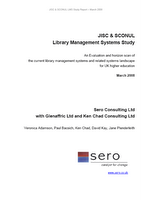A Note to ILS Vendors: Can't We All Just Get Along?
 In the course of putting together the JISC/SCONUL Library Management Systems Study, the authors interviewed the four major vendors of integrated library systems in higher education in the U.K.: Ex Libris, Innovative Interfaces, SirsiDynix and Talis. Among the "who are you" and "what do you do" questions were two that get to the heart of what many of us are clamoring for from our vendors:
In the course of putting together the JISC/SCONUL Library Management Systems Study, the authors interviewed the four major vendors of integrated library systems in higher education in the U.K.: Ex Libris, Innovative Interfaces, SirsiDynix and Talis. Among the "who are you" and "what do you do" questions were two that get to the heart of what many of us are clamoring for from our vendors:
- How do your products interoperate with products those from other LMS/ERM vendors?
- Do you have partnerships with other LMS/ERM vendors?
Since three of the four are also leading vendors in North America (and I'm betting the fourth would like to be one as well), I think it is instructive to look at how these four vendors answer these two questions. ((Adamson, V., Bacsich, P., Chad, K., Kay, D., & Plenderleith, J. (2008). JISC & SCONUL Library Management Systems Study. 156 p. Retrieved April 17, 2008, from http://www.jisc.ac.uk/media/documents/programmes/resourcediscovery/lmsstudy.pdf.))
Ex Libris
How do ExLibris products interoperate with products those from other LMS/ERM vendors?
We interoperate with our own products first (e.g. Primo and MetaLib) but all new products designed to interoperate more widely by means of standards
Does ExLibris have partnerships with other LMS/ERM vendors?
With Talis for Verde
Innovative Interfaces
How do Innovative products interoperate with those from other LMS/ERM
vendors?Our history is rooted in providing products that interoperated with other products. This continues with ERM for example
Does Innovative have partnerships with other LMS/ERM vendors?
No. Our aim is to provide best of breed across the whole range of library needs. Of course we don't stand in the way of libraries that wish for example to add Aquabrowser or Endeca. However we want to provide solutions that are better. To date, we haven't seen a big groundswell for these types of products...for all of the press and interest it has gotten, products like Endeca haven't made a major dent in the marketplace.
SirsiDynix
How do SirsiDynix products interoperate with those from other LMS/ERM
vendors?Z39.50 and other, APIs (SD has been doing this API stuff for over 15 years). We work with other vendors through our certification programme -- in particular for SIP2 and NCIP. All other ILS vendors are supported through Z39.50 as well as federated search programs.
Partnerships with other LMS/ERM vendors?
No genuine partnerships with LMS competitors (e.g. to cross sell products).
Deeper integration is available for resource sharing and ILL.
Talis
How do Talis products interoperate with those from other LMS/ERM vendors?
Talis List integrates with all LMSs and Talis Base does too (via Ztarget). Gateway (EDI) will interoperate but it not quite there yet. We work with other link resolvers, self-serve, and SRU/SRW services etc
Keystone is focussed on our own LMS for now but is designed to enable interoperability with other LMSs. Anything new we develop is standards based to work with other LMS and as appropriate with other external system
Partnerships with other LMS/ERM vendors
The only formal relationship is with ExLibris. Our Connexions programme includes working with ExLibris with Verde but there were some problems because Verde didn't support 1Cate (now OCLC resolver), which the customer wanted to continue to use.
In section 4.41 of the report ("The staff perspective on the LMS"), the authors quote a passage from Carl Grant's blog ((Grant, Carl. (2007 Jul 4) A symphony out of tune: when companies go deaf. Care-Affiliates blog. Retrieved 13-Jun-2008 from http://www.care-affiliates.com/thoughts/archives/6.)): "These companies have become unresponsive to the collective goals of our profession and, like so much of our society these days, are no longer focused on the we but the me. It is a sad state of affairs and one that will not be tolerated." There is a growing desire from the library community, particularly in the U.K. with the formal study of the JISC Information Environment for higher education institutions, to have systems interoperate in a clean, service-oriented architecture kind of way.
The vendor responses, on the other hand, would seem to be more akin to one-upmanship and isolationism: we look to interoperate with ourselves before others, we'll interoperate if we're at the center, you're on your own if you want to try to integrate another product with ours, we'll interoperate if others play by our rules. This isn't what the customer is looking for.
Too harsh of an assessment? Let me know in the comments.
The text was modified to update a link from http://www.care-affiliates.com/thoughts/archives/6 to http://web.archive.org/web/20071231052258/http://www.care-affiliates.com/thoughts/archives/6 on November 13th, 2012.